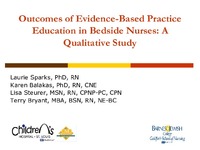Outcomes of evidence-based practice education in bedside nurses: A qualitative study
View File(s)
- Author(s)
- Details
-
Laurie A. Sparks, PhD, RN, CPNP; Karen A. Balakas PhD, RN, CNE
Visitor Statistics
Visits vs Downloads
Visitors - World Map
Top Visiting Countries
| Country | Visits |
|---|
Top Visiting Cities
| City | Visits |
|---|
Visits (last 6 months)
Downloads (last 6 months)
Popular Works for Sparks, Laurie A. by View
| Title | Page Views |
|---|
Popular Works for Sparks, Laurie A. by Download
| Title | Downloads |
|---|
View Citations
Citations
Practicing nurses today are expected to incorporate best evidence in their care. Evidence-based practice (EBP) has become recognized as the gold standard of care, prompting many healthcare organizations to invest resources into the creation of a culture that sustains the use of evidence for direct care decision-making. Previous research has focused on nurses' knowledge and attitudes regarding EBP and this data has indicated an inability of nurses to incorporate EBP in daily practice. Although outcomes of an EBP program are often measured in terms of completed projects, the goal of our program was to change the clinical decision-making of the bedside nurse so that EBP was consistently integrated into clinical practice. The purpose of this research was to describe the perspectives and factors related to the incorporation of evidence-based practice for clinical decision-making by staff nurses who have completed our Evidence-Based Practice (EBP) Scholars Program. An interpretive, phenomenological approach was used with focus groups for data collection. A semi-structured questionnaire developed by the investigators along with field notes comprised the study instruments. Audio tapes were transcribed and semantic content analysis was used to code data for meaning as well as to count the frequency of themes by each question. Following a deliberate, purposeful analysis process, the investigators identified several themes categorized as: Re-igniting a passion for nursing; Strengthening relationships; Empowering their own voice; Supporting the institution Programs to teach bedside nurses how to incorporate EBP into care delivery not only result in better outcomes for patients but also greatly contribute to the sustained enculturation of EBP as a foundation for nursing practice. Reflections of the participants showed a deepening personal and professional growth beyond the course itself.
41st Biennial Convention - 29 October-2 November 2011. Theme: People and Knowledge: Connecting for Global Health. Held at the Gaylord Texan Resort & Convention Center.
Items submitted to a conference/event were evaluated/peer-reviewed at the time of abstract submission to the event. No other peer-review was provided prior to submission to the Henderson Repository, unless otherwise noted.
| Type | Presentation |
| Acquisition | Proxy-submission |
| Review Type | Abstract Review Only: Reviewed by Event Host |
| Format | Text-based Document |
| Evidence Level | N/A |
| Research Approach | N/A |
| Keywords | Education; Evidence-Based; Research |
| Name | 41st Biennial Convention: People and Knowledge: Connecting for Global Health |
| Host | Sigma Theta Tau International |
| Location | Grapevine, Texas USA |
| Date | 2011 |
All rights reserved by the author(s) and/or publisher(s) listed in this item record unless relinquished in whole or part by a rights notation or a Creative Commons License present in this item record.
All permission requests should be directed accordingly and not to the Sigma Repository.
All submitting authors or publishers have affirmed that when using material in their work where they do not own copyright, they have obtained permission of the copyright holder prior to submission and the rights holder has been acknowledged as necessary.
Related items
Showing items related by title, author, creator and subjects.
-
A randomized control trial to test the differences in educational methods used to enhance nurses' knowledge, attitudes, and practice of evidence-based practice
Ecoff, Laurie; Toole, Belinda M.; Stichler, Jaynelle F. (2012-9-12)Purpose: The purpose of this study was to test the effectiveness of a computer-based, self-administered education module as compared to the in-class presentation of the same education module on nurses' knowledge, attitudes, ... -
Exploring evidence-based practice norms among bedside nurses in Magnet-designated hospitals: A Q methodology study
Ramsey, RachelEvidence-based practice (EBP) is a recognized standard of professional nursing due to its positive impact on care quality and patient outcomes. Despite ongoing efforts to maximize EBP at the point of care, current estimates ... -
Improving health outcomes for surgical patient in Nicaragua: Empowering nurses participating in a multidisciplinary cleft lip and palate team implementing evidence-based practice solutions
Pfaff, Teresa A.; Perez, Maria Julia; Terry, Anina; Gomez, Carmen Maria Urruita (2014-11-17)Session presented in Saturday, July 26, 2014: In Nicaragua, the increase in those suffering from the congenital malformation of cleft lip and palate has bee seen across a diverse range of socio-economic levels. Although ... -
A first look at undergraduate nursing students' knowledge of evidence-based practice using the evidence-based practice knowledge assessment in nursing
Wonder, Amy Hagedorn; Spurlock, Darrell R. Jr. (2016-03-17)Session presented on Friday, July 24, 2015: Purpose: The quantitative relationship between self-reports of competence and objectively measured performance is generally < r = .3 and in a striking number of studies, ... -
Evidence-based practice knowledge and beliefs among associate degree nursing students: A national, multisite study
Wonder, Amy Hagedorn; Spurlock, Darrell R. Jr. (2018-03-29)Although emphasis is placed on preparing baccalaureate nursing students for EBP, associate degree nurses often work in similar, generalist roles. This presentation, reporting on a multi-site study of associate degree nursing ...





